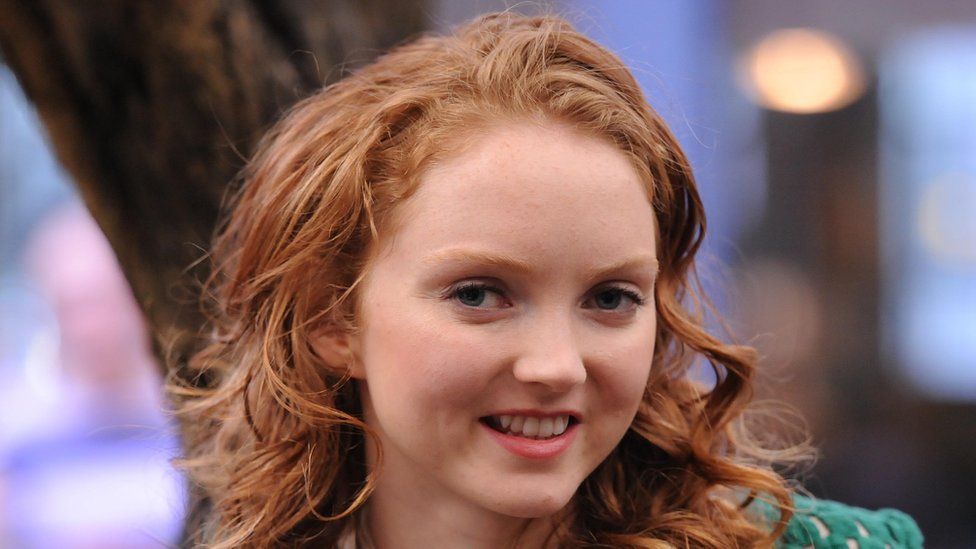How Lily Cole swapped modelling for social activism
- Published

Lily Cole doesn't fit most people's expectations of a supermodel.
First modelling for a fashion photographer when she was just 13, she has gone on to enjoy a long - and very lucrative - career in front of the camera.
From the catwalks of the world's main fashion weeks, to photo shoots on tropical beaches, the British model has enjoyed a jet-set lifestyle.
And by 2013, Ms Cole had amassed an estimated fortune of £4m, according to the Sunday Times Rich List.
Now 28, she has worked for brands including Chanel, Louis Vuitton, Jean Paul Gaultier and Versace.
Yet in addition to all the glitz and glamour, Ms Cole took time out from modelling in her early 20s to attend top UK university Cambridge, which she graduated from in 2011 with a double first in the history of art.
In recent years Ms Cole has increasingly branched out into acting, with roles in films such as Snow White and the Huntsman, and TV shows including Doctor Who.
Today she says she has mostly left the modelling work behind her, and instead divides her working life between her acting projects and her time running a social enterprise called Impossible.
Impossible is a website through which people can arrange to do a job for someone else for free. Part of the so-called gift or sharing economy, users can both request for something to be done, such as find someone to walk their dog, or offer a service, such as guitar lessons.
Ms Cole says she had long had the thought in the back of her mind, and decided to start London-based Impossible in December 2013 after her friends kept saying it was such a good idea.
The launch was widely reported, and it is fair to say that some of the coverage was sceptical. A number of critics accused Ms Cole of being too idealistic or even naive.
Meanwhile others said Impossible - which is also a not-for-profit social enterprise - was self-indulgent. They argued that while it is fine for a multimillionaire to launch such a venture, the rest of us would need it to be make a profit.
A steely Ms Cole, who also actively campaigns to promote the social enterprise model, and the need for all companies to improve their social and environmental impact, says she has no time for such critics.
"I wouldn't even bother giving them [the critics] my opinion," she says.
"You can be business minded and still be socially responsible. Social business has been tried and tested, and even though it is not the norm, there are lots of examples of it working that you can point to."
'Think creatively'
Born in Devon in southwest England, and then raised in London, Ms Cole says that although running Impossible can be "challenging", it is "definitely more enjoyable than modelling".
While Impossible has yet to break even, she says it now has thousands of users in 121 different countries, and had seen fivefold annual growth.
Ms Cole adds that she and her team at Impossible - seven paid staff and a number of volunteers - are also working towards the business eventually making money, which will then be invested back in the operation.
Although users who share their services do not have to pay Impossible any money, they have the option to pay a monthly subscription, which Ms Cole says is "a voluntary payment, so almost like a donation".
To encourage users to do this, subscribers get an Impossible email address, and free magazines.
Impossible also has an online marketplace, which sells ethically produced products made by third parties, from whom it takes a sales commission.
Ms Cole says: "It is challenging for any new business to succeed from a profit perspective. When you couple that with caring about your social and environmental impact makes it even harder.
"This is because you can't be so aggressive with your margins, you can't feel OK with not paying people enough, or having a negative environmental impact. And there is a financial cost to doing the right thing that makes it more challenging.
"Yet it is totally possible [to make money and be socially responsible], you just have to think creatively."
Looking ahead, Ms Cole predicts that the number of social enterprises will only continue to grow, because a rising number of socially and environmentally aware young people are demanding it from the companies and products they use. "It is becoming more and more of a priority," she says.
'Start lean'
Ms Cole says her working life puts her in two totally different worlds. One week she might be filming on location, while the next she is back in London at the Impossible offices filling in a spread sheet, or "geeking out over how we interpret our data better".
She also makes time to attend events which promote social enterprise, such as attending the finals of a scheme called The Venture, which is organised by whisky brand Chivas. The Venture is a global competition for would-be young social entrepreneurs.
Sophie Gallois, managing direct of Chivas, says: "Social enterprise is a subject that Lily is clearly very passionate about.
"The points she raised at the Chivas The Venture discussion really highlighted the importance for big business to take more responsibility for their social impact."
For other idealistic young people who want to set up a social enterprise to help change the world for the better, Ms Cole says they should focus instead on a very small customer base to begin with.
"It is so easy to get swept up in imagining a massive world-changing idea, but instead you need to start lean, and get something right for a small audience first," she says.
"And from there you can grow in scale."